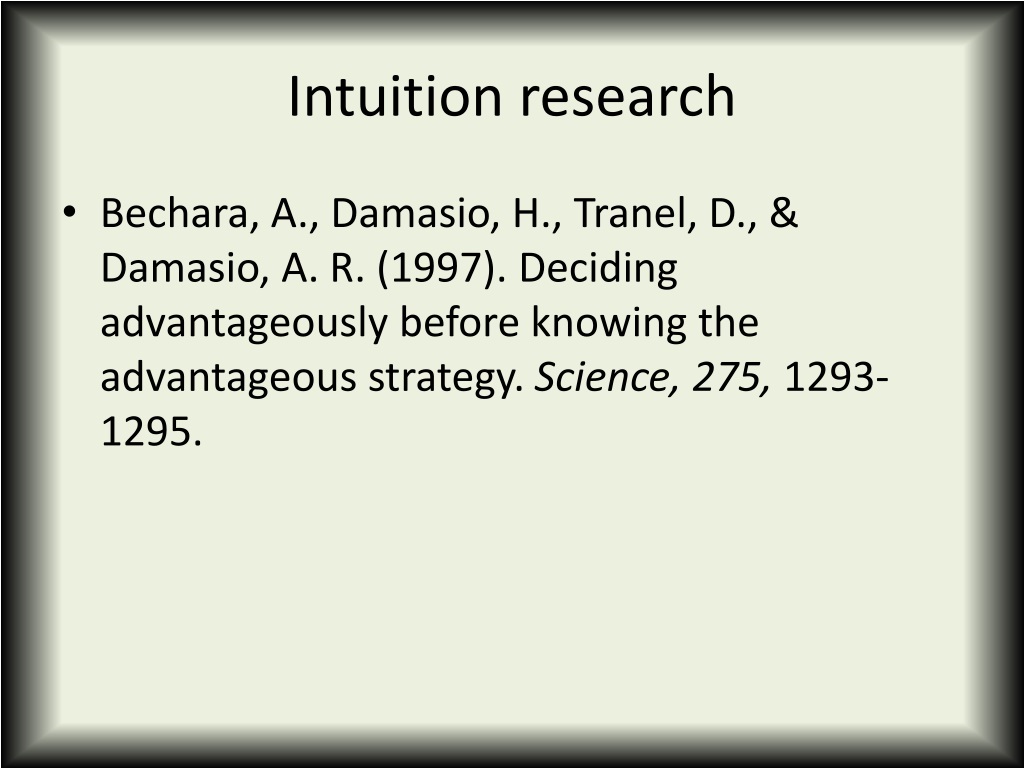The Iowa Gambling Task and the somatic marker hypothesis: some questions and answers A. Damasio Department of Neurology (Division of Cognitive Neuroscience), University of Iowa College of Medicine, Iowa, USA A recent study by Maia and McClelland on participants' knowledge in the Iowa Gambling Task. The study employed the standard administration procedure for the Iowa Gambling Task (Bechara et al., 1994), using real (rather than facsimile) money — where $1000 on the.
- Bechara's Gambling Task is more popularly known as Iowa Gambling Task (IGT) which was studied by Antoine Bechara, Antonio Damasio, Hanna Damasio, and Steven Anderson, researchers from the University of Iowa. In this psychological task, the participants' decision-making skills were observed as they played a virtual card game.
- Iowa Gambling Task Professional Manual. Lutz, FL: Psychological Assessment Resources, Inc. Has been cited by the following article: TITLE: Call for an Integrative and Multi-Disciplinary Approach to Traumatic Brain Injury (TBI) AUTHORS: Alfred Mansour, Renee Lajiness-O'Neill.
- Chapter 1 Modelling decision making in humans: the Iowa Gambling Task 1.1 Developing a simulation of real-life decision-making When it was designed by Bechara and colleagues in the early 90s (Bechara et al., 1994), the IGT.
Contents |
Iowa Gambling Task Bechara
[edit]About
In this test, subject chooses from one of four decks, each having a different reward schedule. This task is based on Bechara et al's so-called 'Iowa Gambling task'
In this procedure, subjects are given $2000 to begin. On each trial, they are given the choice of four decks,and after each card, they are given a reward of some amount; after some cards, they are givena reward and pay a penalty.
[edit]Notes
The penalty/reward structure is identical to that in Bechara et al.with 40 cards per deck, and the identical reward structure.When 100 cards have been selected, the task is complete.
Unlike the real-world version, the deck is just rotated on each draw, so that the top card moves to the bottom of the 40-card deck,and so the sequence will repeat after 40 cards in the original order, rather than becoming exhausted after 40 draws.
[edit]Options
- By default, the penalty cards are in the order originally published by Bechara et al. Setting shuffleDecks <- 1 (from 0) will shuffle the penalty decks
before the experiment. Shuffling is performed in 10-card epochs, so that the penalty in 1-10 stay in 1-10, etc.
- Baseline rewards for each deck can be changed as well, using the deck1Rew, deck2Rew, deck3Rew, and deck4Rew variables.
- The variable gUseMouse controls whether interaction is done using the mouse or keyboard input. Set to 0 for keyboard, 1 for mouse. It is 1 by default.
- The variable numtrials controls how many trials are used. Cards in decks get rotated from top to bottom, so there is no great danger of running out of cards.

[edit]Data Output
Iowa Gambling Task Bechara Et Al 1994
Data are saved to igt-X.txt, where X is the participant code. The columns are:
Each row is a trial. You are probably most interested in the proportion that each deck is chosen, which is the third column.
[edit]References
Bechara A, Damasio A. R., Damasio H, & Anderson S. W. (1994). Insensitivity to future consequences following damage to human prefrontal cortex. Cognition.
Bechara 1994 Iowa Gambling Task
[edit]Research Using Test
- Kaare, P. R. (2008). Correlates of pathological gambling in Estonia: Personality, emotional states, self-esteem, cognitive ability and decision-making strategies. University of Tartu Master Thesis.
- Kaare, P. R., Mõttus, R., & Konstabel, K. (2009). Pathological Gambling in Estonia: Relationships with Personality, Self-Esteem, Emotional States and Cognitive Ability. Journal of Gambling Studies, 25(3), 377-390.
- Lipnicki, D. M., Gunga, H. C., Belavy, D. L., & Felsenberg, D. (2009). Bed Rest and Cognition: Effects on Executive Functioning and Reaction Time. Aviation, space, and environmental medicine, 80(12), 1018-1024. http://www.ncbi.nlm.nih.gov/pubmed/20027848
- Lipnicki, D. M., Gunga, H., Belavy, D. L., & Felsenberg, D. (2009). Decision making after 50 days of simulated weightlessness. Brain Research, 1280, 84-89. doi:10.1016/j.brainres.2009.05.022 http://www.ncbi.nlm.nih.gov/pubmed/19447099